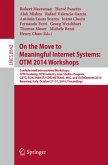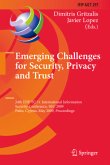NewInternetdevelopmentsposegreaterandgreaterprivacydilemmas. Inthe- formation Society, the need for individuals to protect their autonomy and retain control over their personal information is becoming more and more important. Today,informationandcommunicationtechnologies andthepeopleresponsible for making decisions about them, designing, and implementing them scarcely consider those requirements, thereby potentially putting individuals privacy at risk. The increasingly collaborative character of the Internet enables anyone to compose services and contribute and distribute information. It may become hard for individuals to manage and control information that concerns them and particularly how to eliminate outdated or unwanted personal information, thus leavingpersonalhistoriesexposedpermanently. Theseactivitiesraisesubstantial new challenges for personal privacy at the technical, social, ethical, regulatory, and legal levels: How can privacy in emerging Internet applications such as c- laborative scenarios and virtual communities be protected? What frameworks and technical tools could be utilized to maintain life-long privacy? DuringSeptember3 10,2009,IFIP(InternationalFederationforInformation Processing)workinggroups9. 2 (Social Accountability),9. 6/11. 7(IT Misuseand theLaw),11. 4(NetworkSecurity)and11. 6(IdentityManagement)heldtheir5th InternationalSummerSchoolincooperationwiththeEUFP7integratedproject PrimeLife in Sophia Antipolis and Nice, France. The focus of the event was on privacy and identity managementfor emerging Internet applications throughout a person s lifetime. The aim of the IFIP Summer Schools has been to encourage young a- demic and industry entrants to share their own ideas about privacy and identity management and to build up collegial relationships with others. As such, the Summer Schools havebeen introducing participants to the social implications of information technology through the process of informed discussion.








